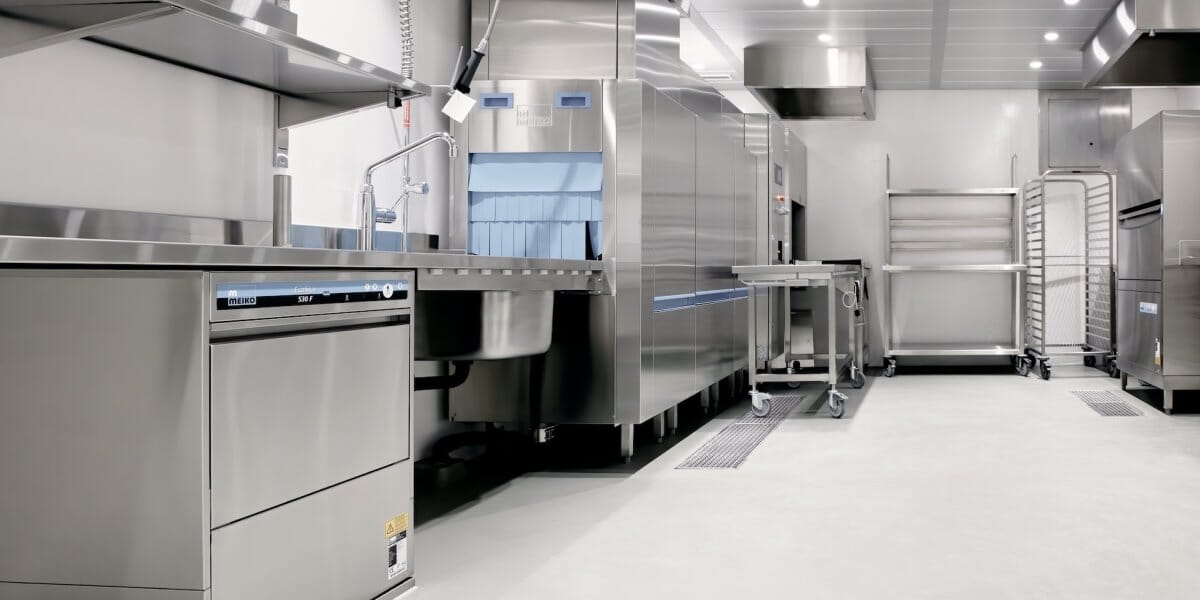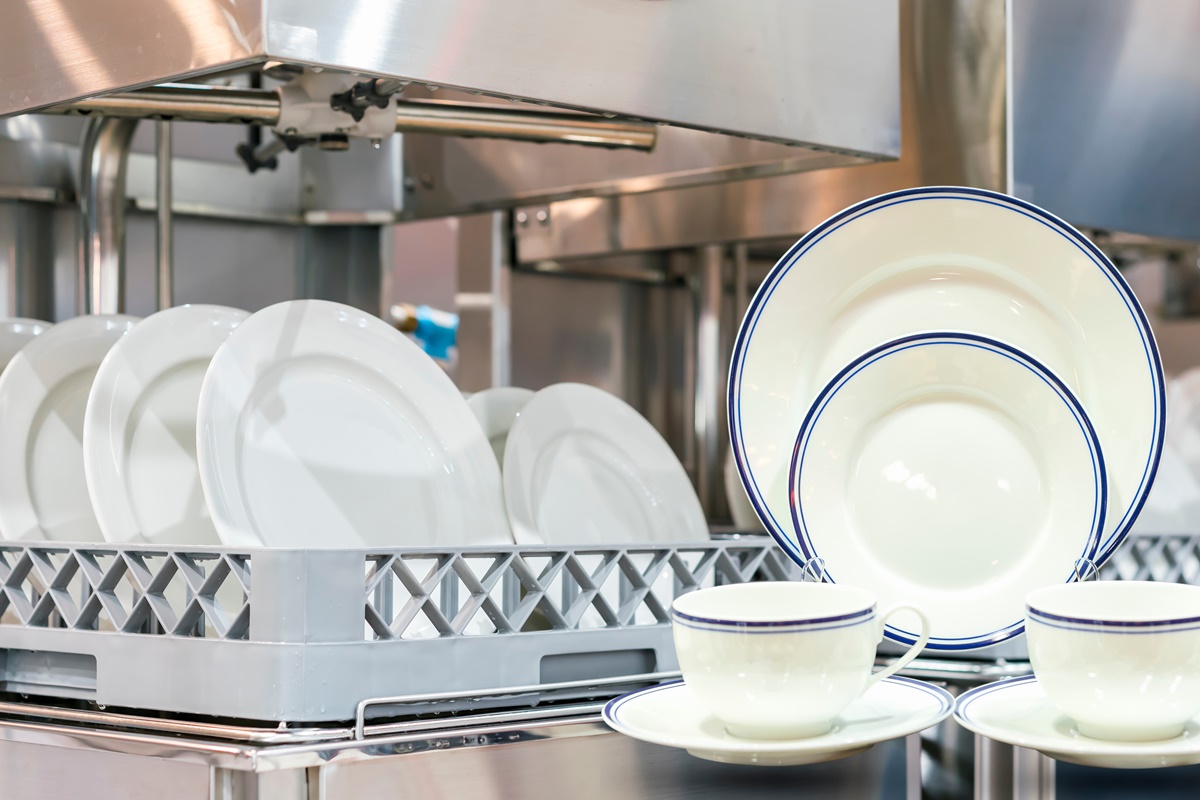
September 20, 2023
Commercial Dishwashers vs Domestic Dishwashers: A UK Comparison
When it comes to cleaning dishes, there are two main options available: commercial dishwashers and domestic dishwashers. While they may look similar, there are significant differences between the two, especially in terms of their functionality, size, efficiency, and cost. If you're trying to decide which option is right for you, it's important to understand the unique benefits and drawbacks of both. In this section, we will compare the key differences between commercial dishwashers and domestic dishwashers in the UK.




Key Takeaways
- Commercial dishwashers and domestic dishwashers are two different options for cleaning dishes.
- There are significant differences between the two in terms of their functionality, size, efficiency, and cost.
- Commercial dishwashers are designed to handle higher volumes and tougher stains, while domestic dishwashers are more suitable for smaller households and lighter loads.
- Commercial dishwashers may require professional maintenance and have a higher upfront cost, while domestic dishwashers are generally easier to maintain and more affordable.
- Your specific requirements and usage patterns should be considered when choosing between the two options.
Functionality and Capacity
Commercial dishwashers and domestic dishwashers differ significantly in functionality and capacity. Commercial dishwashers are built to handle higher volumes and tougher stains, while domestic dishwashers are more suitable for smaller households and lighter loads. Commercial dishwashers offer a range of functions to speed up the cleaning process and maximize efficiency. They often have multiple wash cycles, such as pre-wash, wash, rinse, and sanitize, to ensure that dishes are thoroughly cleaned and sanitized. In addition, commercial dishwashers have powerful water jets and high-temperature settings to remove stubborn stains and grease. On the other hand, domestic dishwashers are designed for convenience and ease of use. They typically have fewer wash cycles and lower water pressure, but are still capable of cleaning dishes effectively. Domestic dishwashers are also more compact than commercial models, making them suitable for smaller kitchens and households with limited space. Capacity is another key factor that sets commercial and domestic dishwashers apart. Commercial dishwashers are designed to handle high volumes of dishes, with some models able to clean up to 200 plates per hour. They also have larger racks and wash chambers to accommodate larger utensils and dishes, such as baking sheets, mixing bowls, and pots and pans. In contrast, domestic dishwashers have a smaller capacity, typically ranging from 12 to 16 place settings. This makes them more suitable for smaller households and families. However, some models may offer adjustable racks and foldable tines to maximize the use of space and accommodate larger items.
Size and Design
One of the significant differences between commercial dishwashers and domestic dishwashers is their size and design. Commercial dishwashers are typically larger and more robust than their domestic counterparts, making them capable of handling more substantial loads of utensils and dishes. Commercial dishwashers are also designed to accommodate larger and irregularly shaped items like pots, pans, and baking sheets. Even the baskets and racks inside commercial dishwashers are more durable and have higher capacities, making them ideal for busy kitchens that require constant cleaning and sanitizing. On the other hand, domestic dishwashers are designed to fit seamlessly into kitchen spaces in homes, apartments, and small offices. They come in different sizes to match the needs of smaller households, and some models even offer flexible loading options to maximize space. Additionally, domestic dishwashers come in various designs with different finishes, such as stainless steel, black, white, and more, allowing homeowners to choose a dishwasher that complements the overall décor of their kitchen.Comparing Sizes and Dimensions
Commercial dishwashers are available in various sizes and dimensions to suit different business needs. Standard commercial dishwashers typically have a width of 24 inches, a depth of 25 inches, and a height of 84 inches, whereas larger models can measure up to 90 inches in height. There are 450mm width commercial dishwashers available if space is limited. On the other hand, domestic dishwashers come in different sizes, ranging from compact models that measure 18 inches in width, 22 inches in depth, and 32 inches in height to standard models that measure 24 inches in width, 24 inches in depth, and 34 inches in height. It's essential to consider the size and dimensions of a dishwasher based on the available space in your kitchen or workspace.Efficiency and Cost
When it comes to efficiency and cost, commercial dishwashers and domestic dishwashers have different advantages and drawbacks. Commercial dishwashers are built to be highly efficient, with faster wash cycles and lower water and energy consumption per load. This not only leads to cost savings in the long run but also reduces the impact on the environment. However, commercial dishwashers come with a higher initial cost compared to domestic dishwashers, which may deter smaller businesses and households from investing in them. Additionally, commercial dishwashers may require a higher voltage power supply, which could incur additional installation costs. On the other hand, domestic dishwashers are generally more affordable but may not be as efficient as their commercial counterparts. They often have longer wash cycles and consume more water and energy per load. However, modern domestic dishwashers have improved significantly in terms of energy efficiency and may still be a cost-effective option for smaller households.
Maintenance and Durability
Commercial dishwashers are built to withstand heavy use, making them more durable than domestic dishwashers. However, this also means that they require more maintenance to keep them running optimally. Due to the complexity of their design, some maintenance tasks may require professional assistance, which can add to the cost of upkeep. This is particularly true for parts such as pumps, motors, and valves, which can wear out over time and need to be replaced. Regular cleaning is also crucial to maintain the hygiene of commercial dishwashers, especially in busy settings such as restaurants. Failure to do so can result in a buildup of dirt, grease, and food particles, which can affect the dishwasher's performance and may even cause it to break down. Domestic dishwashers, on the other hand, are generally easier to maintain. They are designed with simpler mechanisms that are less prone to wear and tear, making them more durable in the long run. Regular cleaning is still important, but it can be done by the user without the need for professional assistance. This makes domestic dishwashers a more cost-effective option, as they do not require regular maintenance costs.Conclusion
In conclusion, it is clear that commercial dishwashers and domestic dishwashers are designed for different purposes and cater to different needs. Commercial dishwashers are best suited for businesses and high-volume settings, offering larger capacities, robust design, and high efficiency, whereas domestic dishwashers are more appropriate for smaller households, providing convenience, cost-effectiveness, and ease of maintenance. When choosing between the two options, it is important to consider your specific requirements and usage patterns. If you run a busy restaurant or hospitality business, a commercial dishwasher may be the best choice for you. However, if you have a small family or live alone, a domestic dishwasher may be more suitable. Furthermore, efficiency, cost, and maintenance requirements should also be taken into consideration when making your decision. While commercial dishwashers may have a higher upfront cost, they can be more cost-effective in the long run due to their high efficiency. On the other hand, domestic dishwashers may require less maintenance, but may have a shorter lifespan. Ultimately, the choice between a commercial dishwasher and a domestic dishwasher depends on your specific needs and circumstances. Regardless of which option you choose, it is important to ensure that your dishwasher is properly maintained and serviced to ensure its longevity and optimize its efficiency.
FAQ
Q: Can a commercial dishwasher be used in a domestic setting?
A: While it is technically possible to use a commercial dishwasher in a domestic setting, it is generally not recommended. Commercial dishwashers are designed for heavy-duty use and may consume more resources, such as water and energy, than necessary for household needs. Additionally, the larger size and higher noise levels of commercial dishwashers may not be suitable for smaller kitchens.Q: Can a domestic dishwasher be used in a commercial setting?
A: Domestic dishwashers are not designed to handle the high demands of a commercial setting. They have smaller capacities and are built with less robust components, making them more prone to breakage and requiring more frequent maintenance. Commercial dishwashers are specifically engineered to handle larger volumes, tougher stains, and are constructed for continuous use.Q: What are the benefits of a commercial dishwasher?
A: Commercial dishwashers offer several benefits, including higher functionality, larger capacities, and increased efficiency. These machines are designed to handle heavy loads, remove tough stains, and sanitize utensils and dishes effectively. Commercial dishwashers are also built to withstand frequent use and require less downtime for maintenance.Q: What are the advantages of a domestic dishwasher?
A: Domestic dishwashers are more suitable for smaller households and lighter loads. They are generally more affordable, consume less water and energy compared to commercial dishwashers, and are designed to fit seamlessly into kitchen spaces. Domestic dishwashers also tend to have lower noise levels, making them more suitable for residential environments.Q: Are commercial dishwashers more energy-efficient?
A: Yes, commercial dishwashers are designed to be highly efficient in terms of water and energy consumption. They are built with advanced technologies, such as heat recovery systems and efficient spray nozzles, that help to minimize resource usage. However, it is important to note that commercial dishwashers may have a higher upfront cost compared to domestic dishwashers.Q: How often do commercial dishwashers require maintenance?
A: The maintenance requirements for commercial dishwashers vary depending on the usage and manufacturer recommendations. Generally, commercial dishwashers require more frequent maintenance compared to domestic dishwashers due to their heavy-duty nature. It is recommended to have professional maintenance conducted regularly to ensure optimal performance and prolong the lifespan of the machine.Q: Can domestic dishwashers accommodate larger utensils and dishes?
A: Domestic dishwashers are designed to accommodate standard-sized utensils and dishes commonly found in households. They may not be able to fit larger or unusually shaped items, such as large baking trays or commercial-grade kitchenware. If you regularly use larger utensils and dishes, a commercial dishwasher with a larger capacity would be more suitable.Q: How long do domestic dishwashers typically last?
A: The lifespan of a domestic dishwasher can vary depending on usage, maintenance, and the quality of the appliance. On average, a well-maintained domestic dishwasher can last between 7 to 12 years. However, some models may last even longer with proper care and regular servicing.Find Your Commercial Dishwasher
To view our extensive range, go to our Commercial Dishwashers section with commercial dishwashers from brands such as DC, Whirlpool, Hobart, Aristarco and more.






